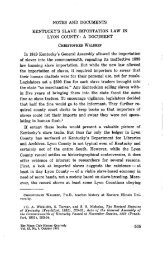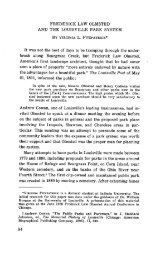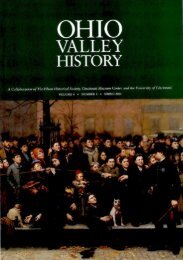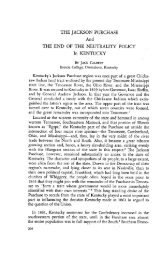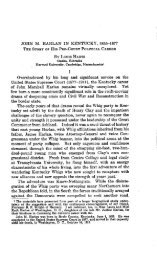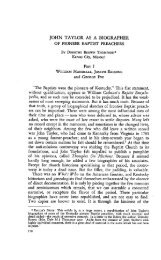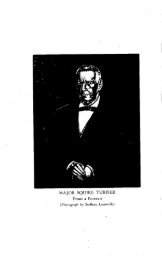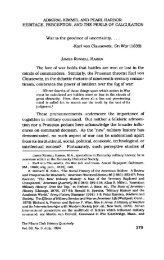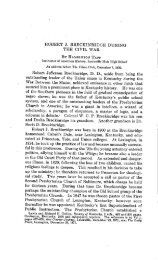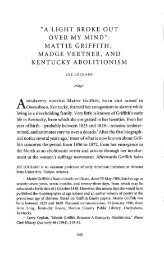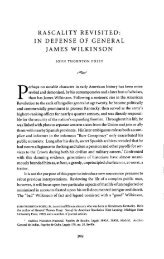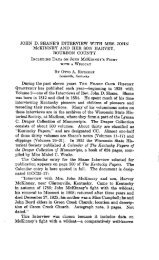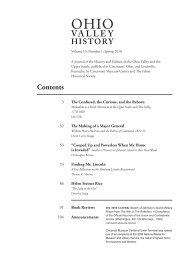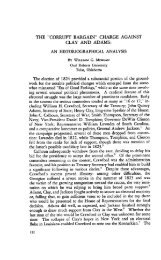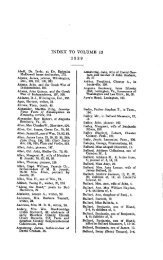CASSIUS M. CLAY, "LION" - The Filson Historical Society
CASSIUS M. CLAY, "LION" - The Filson Historical Society
CASSIUS M. CLAY, "LION" - The Filson Historical Society
You also want an ePaper? Increase the reach of your titles
YUMPU automatically turns print PDFs into web optimized ePapers that Google loves.
146 <strong>The</strong> <strong>Filson</strong> Club History Quarterly [Vol. 31<br />
°Van Deusen <strong>The</strong> Life of Henry Clay, p. 391 (Little, Brown & Co., 1937).<br />
Ibld., p. 392.<br />
* For particulars as to this, see Memoirs, pp. 103-104 and 168-173, where the author<br />
acknowledges himself at fault for the wrong done Henry. Clay .and makes handsome<br />
amends. "As a popular leader, Henry Clay had no equal m his ttmes; and of all our<br />
public men, he began life in the front, and there he stayed till death gathered hma to hzs<br />
fathers . . . Whilst, opposed, in judgment, to slavery, and in general aspiration for .the<br />
liberty of all men Mr. Clay did not avow or conceive a war upon slavery; preferring,<br />
as most statesmen entrusted with the eadersh p in public affairs, to follow where he<br />
could not lead, and still maintain the leadership." See Memoirs, pp. 87-88, 95-101. <strong>The</strong><br />
coolness between the two arose after the campaign of 1844, in the course of which Henry<br />
Clay had felt it necessary to disassociate himselffrom Cassius, because of the pronounced<br />
anti-slavery position the latter was taking in his speeches in the North while stumping<br />
for Henry. It had been further aggravated by the active part taken by James B. Clay<br />
(son of the statesman of Ashland) in the raid on Cassius s press in Augnst, 1845.<br />
*<strong>The</strong> Writings (with Preface and Memoir by Horace Greeley) had been accepted for<br />
publication by Harper & Brothers, prior to the Philadelphia convention which nominated<br />
Taylor, and the book was to come out in the course of the campaign.<br />
'*My book will be out in a few weeks. It is in the hands of the Harpers, the largest<br />
publisher in the Union, who will have sole disposal of it." C. M. Clay to B. J. Clay,<br />
letter of May 29 1848, in the Brutus J. Clay papers.<br />
U lt is of some significance that in the Centra Bluegrass indignation at Clay for<br />
publishing <strong>The</strong> True American was strongest in Woodford, County, the home of Thos.<br />
F. Marshall, eloquent Whig orator, and in Scott, home of Richard M. Johnson, leader of<br />
Democratic party, and others of the same family. See Memoirs, pp. 139-140, 230-231.<br />
6, On a ticket with George D. Blakey for Lieut.-Governor. Blake'/, like Cassius M.<br />
Clay, had liberated atl his slaves. Memoirs, p. 212. While receiving less than 5,000<br />
votes, this was greater than the margin of victory of Powell (Democrat) over Dixon<br />
(Whig), so that if Clay's vote had gone to Dixon the Whigs would have won the governorship.<br />
Though in 1855, Morehead was elected Governor on the Amer can (Know-<br />
Nothing) ticket with Whig support, the Whig party, long dominant in the state, never<br />
again was able to win the governorship. <strong>The</strong> party soon was also to disappear on the<br />
national scene.<br />
u Cf. <strong>The</strong> ,Filsou Club History Quarterly, Smiley, "Cassius M. Clay and Southern<br />
Industrialism, Vol. 28, No. 4, pp. 315-327 (Oct. 1954).



